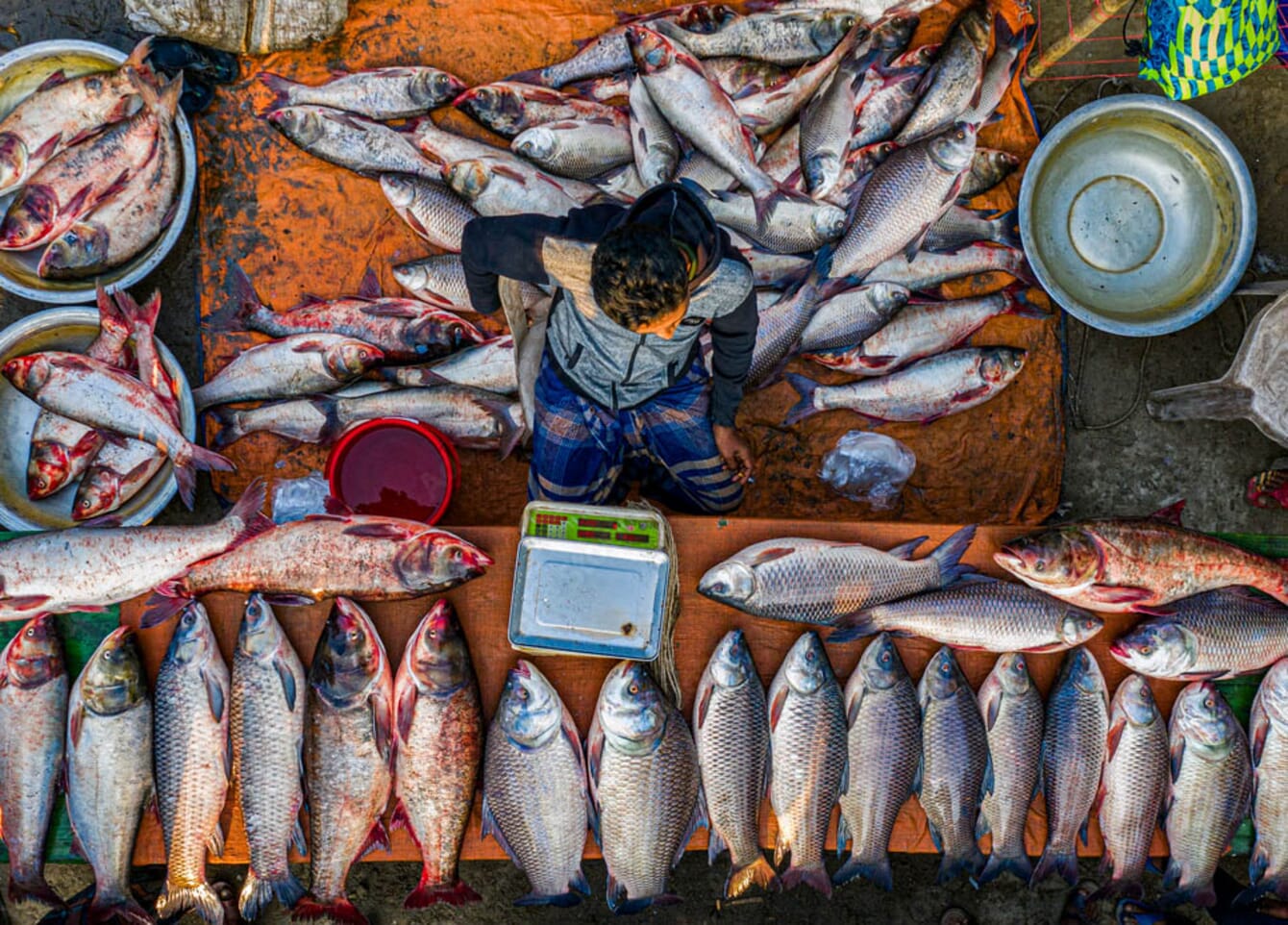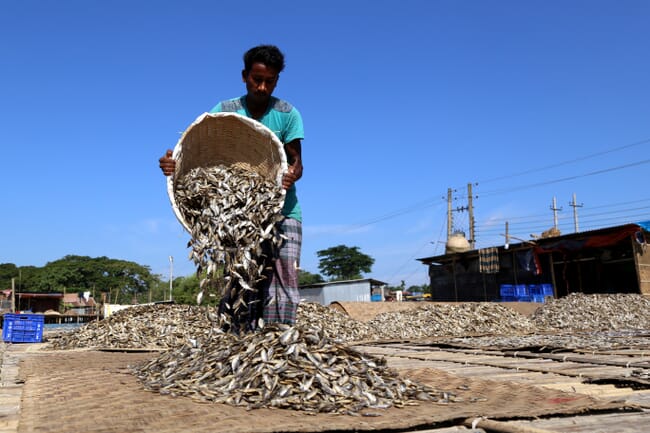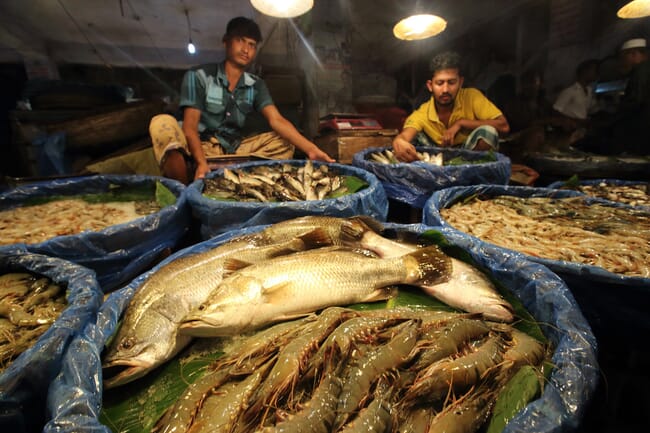
© Shutterstock
In Bangladesh, fish and shrimp are not just food items; they are woven into the country’s culture and economy. However, a longstanding prejudice against frozen seafood has stifled the growth of the local market. Local people believe that frozen fish and shrimp lack the freshness and quality of those purchased from wet markets. This perception not only holds the industry back but also puts consumer health at risk, as mishandled fish from these markets often undergoes multiple freeze-thaw cycles that degrade its quality.
Historically, Bangladesh’s rivers, estuaries and canals were teeming with fish and local people could rely on fresh catches daily, whilst the storing of fish was rare. rare,
However, as Bangladesh’s population rapidly expanded, the country’s landscape began to change. This rapid, unplanned expansion and associated pollution greatly reduced the natural water networks that had once supported local fisheries. With fewer natural sources of fish and a growing population, the traditional reliance on wild fish was no longer sustainable. However, the concept of the superiority of fresh fish still persists today.
Starting in the 1990s, fish farming started to gain momentum, providing a reliable and controlled alternative to dwindling wild fish stocks. Today, Bangladesh ranks 5th globally in aquaculture production, according to FAO’s State of World Fisheries and Aquaculture 2022.
Although many were initially reluctant to embrace farm-raised fish and shrimp, they eventually had no choice but to adapt. With the natural sources of fish becoming scarce, farm-raised varieties became the primary option in markets across the country. Now, most of the fish and shrimp available in markets across Bangladesh are farm-raised, playing a crucial role in meeting the country’s food security needs.
From farm to market: hidden dangers
Fish and shrimp in Bangladesh go through a long and often problematic journey before reaching consumers. After being harvested, fish are often transported without proper cold chain procedure, which causes a decrease in freshness. At the wholesale markets, ice is applied to preserve the fish and shrimp for transport to larger markets in bigger cities.
By the time fish reaches retail shops in large urban areas, there is already significant quality loss. Retailers, eager to market these products as fresh, defrost the frozen or semi-frozen fish. Moreover, many retailers refreeze their unsold stock to sell them on the next day – a process which repeats until the stock is cleared.
Consumers, unaware of this process, purchase what they believe to be fresh fish and shrimp, often freezing products again at home for future use.

© Shutterstock
Health risks of repeated freezing and defrosting
The prejudice against frozen fish is rooted in the belief that fresh fish is healthier and of better quality. Ironically, this preference for fresh often leads to the consumption of fish that has been repeatedly frozen and defrosted -an unsafe practice that many consumers are unaware of. Every time fish or shrimp is thawed and refrozen it loses water and nutrients, resulting in a potentially hazardous product lower in flavour and nutrition.
The repeated freeze-thaw cycles damage the cell structure of fish and shrimp, making them prone to bacterial contamination. As the product defrosts, bacteria that had been dormant can start to grow, and when it is frozen again, these bacteria remain alive in a dormant state. As the cycle repeats, the concentration of bacteria increases, which can lead to foodborne illnesses. Furthermore, some harmful toxins produced by bacteria are heat-resistant, meaning that even cooking may not fully eliminate health risks.
The impact on local fish and shrimp industries
Current handling practices hold back the growth of the local fish and shrimp industry. While Bangladesh is a major exporter of frozen shrimp and fish, the domestic market is very underdeveloped. This is in stark contrast to international markets, where frozen fish is not only accepted but preferred for its consistency and quality.
Local people, however, continue to pay a premium for fish that has likely undergone improper handling. This reluctance to embrace frozen fish hampers the development of the domestic market, which could otherwise be a major driver of economic growth. It also limits opportunities for more sustainable practices in the industry, such as improved refrigeration, reduced food waste, and year-round availability of high-quality fish.
Acceptance of frozen fish can offer substantial financial benefits to the local farmers as well as consumers. By freezing their products directly after harvesting, farmers can preserve quality. This would allow them to avoid the middlemen who often dictate prices in the wholesale markets, helping farmers take greater control over their earnings. Proper freezing techniques would also extend the shelf life of fish and shrimp, allowing them to sell their stock gradually, rather than all at once, which often results in reduced prices.
For retail sellers, frozen products provide a higher level of quality assurance. They can offer their customers fish that has been preserved at its freshest state, avoiding the risks associated with fish that has been improperly handled. This will also ensure retailers can secure their investment, as frozen fish can be stored for longer periods without the fear of spoilage.

© M. Tushar Ahmed
Overcoming the frozen fish taboo
Changing consumer perceptions and current handling practices will require concerted efforts from both the industry stakeholders and the government. Below are some strategies to address these challenges:
- Educational campaigns
A widespread public awareness campaign is necessary to educate consumers about the dangers of repeated freeze-thaw cycles and the benefits of properly frozen fish and shrimp. These campaigns can explain how flash-freezing preserves nutrients and freshness whilst reducing risks of bacterial contamination from repeated defrosting. - Nutritional comparisons and safety information
Detailed nutritional comparisons between frozen and fresh fish should be made available to consumers, highlighting that frozen fish retains more nutrients than fish that has been frozen and defrosted multiple times. Safety information about the bacterial risks of repeated freeze-thaw cycles can further solidify the argument in favour of frozen fish. - Certification and transparency in supply chains
Establishing a certification system for frozen fish and shrimp may help build consumer trust. Furthermore, transparency across the whole supply chain will help improve consumer confidence in frozen fish. - Endorsement by local influencers and health experts
Engaging prominent local figures such as chefs, nutritionists, and health experts to promote frozen fish may help shift public perceptions. These influencers can share recipes and cooking techniques that showcase frozen fish and shrimp. This will also help normalise the consumption of frozen fish in Bangladeshi cuisine. - Improved retail practices
Retailers play a crucial role in changing consumer habits. They should be trained in proper storage and handling of frozen fish/shrimp to maintain its quality. Encouraging them to sell frozen products rather than defrosting them to appear fresh will ensure better quality and safety for consumers. - Proper forms & packaging
Introducing various forms, cuts and packaging options for frozen fish and shrimp could significantly benefit busy urban consumers. Additionally, providing pre-cut or ready-to-cook fish and shrimp would simplify meal preparation and reduce food waste, catering to the fast-paced lifestyles of city dwellers.
7. Tasting Events and Promotions
Organising taste tests and cooking demonstrations can help prove that frozen fish is just as flavourful and versatile as fresh fish. Promotional discounts and offers can incentivise consumers to try frozen fish, leading to greater acceptance.
The frozen fish prejudice is not just a cultural hurdle - it is a significant public health concern and an economic impediment. By continuing to reject frozen fish, local people are unknowingly consuming lower-quality, less nutritious, and potentially harmful products. Embracing frozen fish could also benefit the entire aquaculture industry by attracting more investment and promoting sustainable development. With the infrastructure in place for freezing, the industry would be better equipped to meet both domestic and export demands year-round.
This would also encourage sustainable farming practices, as farmers would no longer be pressured to harvest all their stock at once to meet short-term market demand. A more stable, year-round market for fish and shrimp would lead to a more secure and profitable industry for everyone involved.
Changing these perceptions will take time, but with education, better industry practices and influencer support, Bangladesh can build a thriving market for frozen fish and shrimp, benefiting both the economy and consumer health.
*A different version of this article was originally published by Seafood Network Bangladesh, Bangladesh’s first dedicated web portal to promote and support the growth of country's seafood and aquaculture sector globally.




